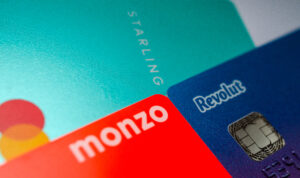
Whilst the Covid-19 pandemic led to a significant increase in UK consumers utilising digital banking – now estimated to stand at 73 per cent of the population – the majority of the UK’s digital banks failed to convert this into increased customer loyalty.
This is amongst the findings of SRM Europe’s Customer Loyalty research, released today.
Starling Bank was, however, the stand-out performer amongst the pure-digital players and now stands almost neck and neck with second-place Nationwide, behind the top-performing brand, First Direct which has commanded the top spot for six of the past eight years. Traditional high street banks, meanwhile, occupy half of the bottom ten performers.
The research, which covers 28 of the UK’s leading retail banks and building societies, has been carried out since 2012 and covers a range of customer metrics with the aim of uncovering the factors that influence customer loyalty. The 2021 report was carried out during July 2021 and creates a post-pandemic baseline to help understand banking performance during Covid and the factors shaping customer loyalty during this time.
Covering three key measures that examine how highly the customer feels valued; how the brand has maintained expected service levels throughout the pandemic; and the timely and relevant communication of information between the brand and its customers, the research confirms First Direct as the brand with the strongest overall performance in all areas. It also uncovers some surprising findings.
Starling Bank and Monzo were the only pure-digital banks to appear within the top ten (at 3rd and 10th respectively), with Starling in particular improving its performance ranking on underlying measures, up from 8th to 3rd. Monzo, meanwhile, lost ground having suffered a drop across all underlying measures – although the fall was from a position of relative strength pre-pandemic. Atom fell just outside of the top ten (11th) for pandemic performance but has seen underlying improvement for digital and experience scores. It was Revolut, however, in 17th position that fared particularly badly.
Jehan Sherjan, Insights Director at SRM Europe, comments: “With such a marked increase in digital banking amongst the majority of UK consumers as a result of the impact of the pandemic, it would have been fair to assume that digital banking specialists would have shone in this research. That’s proven not to be the case in most instances.
“Whilst Starling Bank has convincingly assumed its role amongst the leading pack, thanks to easy to use and functionally rich digital channels, a sense of relationship with its customers, and a strong pandemic performance, inconsistent performance in service experience and aspects of pandemic performance have negatively impacted the likes Revolut and, to a lesser degree, Monzo.”
SRM Europe’s research examines in detail the factors influencing levels of customer loyalty towards the bank they use. With factors covering experience, digital, emotional, social and relationship, as well as the pandemic experience, the findings are clear.
Critically, whilst digital experience and associated functionality are vital measures to get right, alone they do not equate to customer loyalty. SRM’s research clearly demonstrates that consistent delivery across all key measures, resulting in a combination effect, is what is required to secure and maintain customer loyalty. Excellence in one area alone, even if that is the digital experience during a period when it has been much needed and indeed celebrated, simply won’t cut it.
Interestingly, when social conscience factors – so often considered a high priority amongst consumers – are examined more closely, First Direct scores relatively poorly yet maintains its overall position at the top. This suggests that whilst a commitment to making a positive social impact, tackling climate change, and ethicality remain important to the public, they’re not critical factors when choosing a bank.
Jehan concludes: “To maintain and grow loyalty, successful retail banking brands must provide a comprehensive focus on the customer beyond strong digital and transactional foundations.
“Those that have invested time and effort to develop the attributes of a relationship with their customers, together with an emotional connection and a sense of purpose, all alongside a strong digital offer, are those where loyalty remains strongest.
“Critically, social factors do not yet appear embedded in the banking offer (with the exception of Co-op Bank and Triodos Bank) and they certainly don’t appear to be influencing customer loyalty. This may well change as younger age groups are most critical of brand commitment to climate change, a possible indicator of future customer demands.”
Jeff Woodland, Director of Verticals at Five9: “Challenger banks like Monzo and Starling Bank set a new standard for legacy banks. They offered a different way of banking with digital at the heart and this disrupted traditional customer service. As such, traditional banks had to step up. Through scale and innovation, big banks have made significant gains in customer satisfaction over the last decade. However, there’s still a long way to go, as the Competition and Markets Authority’s survey shows.
“But offering great customer service isn’t just about digitising services. While consumers value speed, convenience, and the ability to get quick turnaround answers digitally, for financial services the telephone is still the most used channel when it comes to dealing with personal matters. This is where human contact and technology have to marry up perfectly in order to give the customer a seamless experience.
“Customers want to be able to use digital services for tasks such as getting approval for credit cards or making an online transfer, but when it comes to getting a mortgage or making investments, being able to speak to someone is essential.
“In other words, technology should be used to enhance human contact. Being able to provide an advisor with an overview of what the customer has already filled out or signed will help create that all important seamless experience that will keep existing customers happy and attract new ones.”
Read more:
Digital banks miss pandemic opportunity

